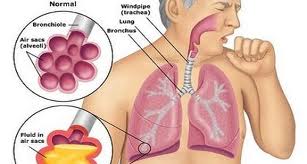Pneumonia is a disease that can affect everyone, but babies, the elderly and those with other medical conditions are the most vulnerable. Pneumonia is characterized by an infection of the lungs, and will cause coughing, fever and in many cases difficulty breathing. Many cases of pneumonia are not severe and you can expect relief in a couple of weeks, but serious cases involving people who have medical conditions may require more extensive treatment.
The Causes of Pneumonia
 Pneumonia is caused by viruses or bacteria, and it usually starts when someone breathes in the bacteria, and it enters the lungs and spreads the infection. You can contract the virus or bacteria anytime, but you are most susceptible if you have the flu or just coming off a bout with cold. Cold and flu both affect your lungs, hence your immune system is weakened and gets infected quickly. In addition, people with long term medical conditions like cancer, diabetes, asthma or heart disease also take longer to recover.
Pneumonia is caused by viruses or bacteria, and it usually starts when someone breathes in the bacteria, and it enters the lungs and spreads the infection. You can contract the virus or bacteria anytime, but you are most susceptible if you have the flu or just coming off a bout with cold. Cold and flu both affect your lungs, hence your immune system is weakened and gets infected quickly. In addition, people with long term medical conditions like cancer, diabetes, asthma or heart disease also take longer to recover.
What are the Symptoms of Pneumonia?
Symptoms manifest quickly and usually include coughing with greenish or blood tinged mucus, although this typically happens in severe cases. Mild pneumonia does include coughing fits but without any sputum. In addition you will also feel feverish, be short of breathe or just feel the need to keep breathing fast. One of the most difficult symptoms of pneumonia is chills, which can reach the point you shake and your teeth rattles. Depending on the severity of the condition, chill episodes may happen just once or repeat several times. Also, virtually all cases of pneumonia feel chest pain when coughing, as well as fatigue and in severe cases diarrhea, vomiting and nausea.
Treatment
If pneumonia doesn’t clear up after a couple of weeks or the symptoms bother you, there are several medications that you can take such as Levofloxacin, a drug used for treating not just pneumonia but also skin infections, bronchitis, kidney and prostate problems and sinus. Unlike other medications that simply relieve the symptoms, Levofloxacin works by actually killing the germs that cause the infection.
Do not take this medication unless you are sure you have pneumonia, so set up an appointment with your doctor, who will perform an x-ray to determine if you have the disease or not. Levofloxacin is available in a liquid solution and tablet form, with dosage once a day. However, your condition will determine how long the treatment goes, so speak with your doctor if you feel the need to extend it.
Levofloxacin tablet may be taken on a full or empty stomach, but the liquid solution has to be consumed one or two hours after you have eaten a full meal. Whether you take it in liquid or tablet form, it’s important you do at the same time each day, and do not consume any more than what your doctor prescribed. Provided you took the drug as indicated, you will feel relief in a few days, but do not stop taking Levofloxacin until you have completed the entire treatment program even if the symptoms have dissipated.
Share This